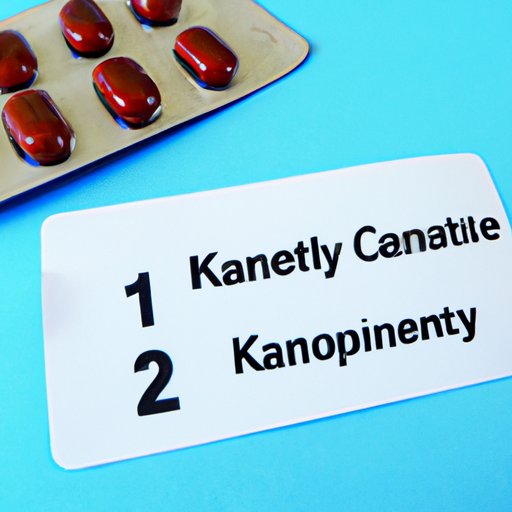
Introduction
Creatinine levels are an important marker that can signal trouble for those living with stage 4 kidney disease. In this article, we will break down what creatinine levels mean for those living with kidney disease by exploring how they are related to kidney function and what can be done to manage them moving forward.
Understanding Creatinine Levels in Stage 4 Kidney Disease: What You Need to Know
Before diving into creatinine levels and stage 4 kidney disease, it is important to understand what creatinine is and how it is measured. Creatinine is a waste product that is created by the breakdown of muscle cells. It is filtered from the body by the kidneys and eliminated through urine. Measuring creatinine levels is a common way to assess kidney function as high levels of creatinine can indicate impaired renal function. In stage 4 kidney disease, creatinine levels are generally elevated and require close monitoring.
The Importance of Monitoring Creatinine Levels in Stage 4 Kidney Disease
Monitoring creatinine levels in stage 4 kidney disease is essential as high creatinine levels can be a signal of kidney damage. As the kidneys function deteriorates, creatinine levels can increase, contributing to further damage. High levels of creatinine can cause complications such as anemia, high blood pressure, and electrolyte imbalances that can impact overall well-being.
Breaking Down Creatinine: A Guide to Its Role in Stage 4 Kidney Disease
Factors such as muscle mass, age, gender, weight, and diet can all impact creatinine levels in the body. However, the main factor that influences creatinine levels is kidney function. As kidney function declines, creatinine levels rise. Monitoring creatinine levels is one way to assess kidney function and determine the best course of treatment for those living with stage 4 kidney disease.
Navigating Stage 4 Kidney Disease: The Connection Between Creatinine and Your Kidneys
In stage 4 kidney disease, a significant loss of kidney function has already occurred. Kidneys are responsible for filtering waste out of the blood, including creatinine. As kidney function decreases, creatinine levels increase as waste is not being adequately eliminated from the body. Monitoring creatinine levels is a key way to understand how well the kidneys are functioning and if further treatment or lifestyle changes are needed.
Why Creatinine Levels Can Signal Trouble for Stage 4 Kidney Disease Patients
High levels of creatinine in those with stage 4 kidney disease can indicate further damage to the kidneys. Common symptoms of high creatinine levels include fatigue, weakness, nausea, and swelling. If these symptoms occur, it is important to seek medical attention as soon as possible as they can indicate further kidney damage, and may require a change in treatment.
Managing Your Creatinine Levels in Stage 4 Kidney Disease: Tips to Prevent Further Damage
There are several steps that can be taken to manage creatinine levels in stage 4 kidney disease. These steps can include dietary changes such as reducing sodium and protein intake, staying hydrated, and maintaining a healthy weight through regular exercise. Working with a medical professional to develop an individualized treatment plan is also essential.

Elevated Creatinine Levels in Stage 4 Kidney Disease: What it Means and How to Lower Them
If creatinine levels continue to rise, medication options and dialysis may become necessary. These treatments help to slow the progress of kidney disease and reduce the risk of complications associated with high creatinine levels. As kidney function continues to decline, it may become necessary to consider transplantation as a long-term solution.
Conclusion
Creatinine levels can be an important marker for kidney function in stage 4 kidney disease. It is essential to monitor creatinine levels closely and follow a treatment plan individualized for each patient to prevent further damage. With proper management, patients can continue to live a healthy lifestyle and manage their kidney disease effectively.


